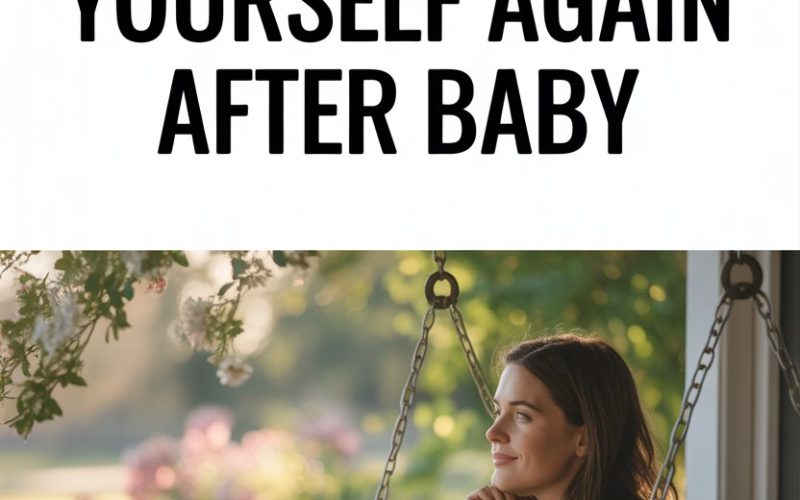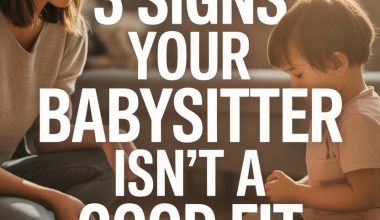There’s a moment—usually at 3:00 a.m., holding a baby who’s finally asleep on your chest, while you debate whether to risk standing up for a biscuit or simply gnaw your sleeve—when you realise you don’t quite recognise yourself anymore.
Parenthood’s great like that.
Between the nappies, coffee-fuelled mornings, and mysterious stains, “you” can slip further down the priority list than the dog’s annual dental check.
Good news: reclaiming the parts of yourself that got buried under muslin cloths and baby wipes isn’t only possible, it can be oddly entertaining.
Here’s how to find yourself again—no meditation retreat required.
Recall Who You Were (and Still Are)
Before you could recite The Gruffalo by heart or had opinions about pram wheels, there was a whole person with dreams, hobbies, and quirks—yes, even the embarrassing ones.
Grab an old photo, an ancient playlist, or a favourite battered book. Let your mind wander to what made you, well, you.
Jot down what you miss. Is it sketching? Watching horror movies? Having a lie-in and then lying about how late you slept in?
You don’t have to resurrect your entire pre-baby personality overnight, but acknowledging your old joys can spark ideas for sneaking them back in, even if it’s just in tiny, espresso-sized sips.
Release the Myth of the Old You
Here’s the awkward truth: you’ve changed. Not just your wardrobe (trackies are in; dry-clean only is out), but your brain, your heart, and likely your patience levels.
Instead of chasing a perfect return to “before,” get curious about the new version of you—one with fresh skills, like one-handed sandwich making and negotiating peace treaties with a toddler.
Embracing this shift doesn’t mean losing yourself to parenthood. It means adding layers.
The new you might actually like certain nursery rhymes. You might discover you’re braver, or sneakier, or have become a master at adulting (or at least faking it for the crowd at soft play).
Steal Pockets of Time Like a Pro
Whoever coined the phrase “sleep when the baby sleeps” probably had a chef, cleaner, and a live-in aromatherapist. For the rest of us, it’s about stealing time when you can.
Ten minutes with a cuppa and a magazine while the baby naps. Five minutes stretching your legs on a walk, podcast in your ears. Singing your favourite song in the car—windows up, off-key as you please.
These micro-moments of “you time” add up, even if they feel laughably short.
Over time, you’ll notice that a bit of regular me-time does wonders for your mental health, and research supports the benefits of such self-care on parental well-being.
Say Yes When People Offer Help (and Ask When They Don’t)
It’s tempting to try to do everything yourself—after all, nobody else alphabetises the onesies quite like you.
But when someone says, “Shall I watch the baby for a bit?” the only correct answer is, “How soon can you start?” Even if you just use the time to stare at a wall, that still counts.
If help isn’t forthcoming, ask. Text a mate, “Fancy a baby cuddle while I shower?”—you’ll be surprised how many people will leap at the chance (babies are cuter and quieter for everyone else, apparently).
Reconnect with Your Body (or at Least Say Hello)
Bodies go through some stuff after pregnancy, and it’s common to feel like you’re living in a stranger’s skin. It’s not about “bouncing back” (let’s never say that phrase again), but about inhabiting your body in new ways.
A gentle walk, a stretch, or even a few minutes of deep breathing can be enough. If you’re up for it, there are handy online workouts designed for postnatal bodies, like those offered at NHS postnatal exercise advice.
Or just turn on your favourite tune and have a kitchen dance party—the baby won’t judge your moves.
Cultivate Mini-Rituals That Are Just for You
Maybe it’s morning coffee in your favourite mug, an evening skincare routine, or writing a single sentence in a journal before bed. These aren’t grand gestures, but they’re sacred little nods to yourself.
Stack your ritual onto something you already do. After the baby’s evening bath, light a candle.
When the pram comes out, pop in your earbuds. Soon, these become anchors—a daily reminder that beneath the nappy bag, the “you” is still there.
Say Goodbye to Parent Guilt (or at Least Give It a Timeout)
The pressure to be “on” all the time can make any attempt at self-care feel selfish. Here’s a radical suggestion: you are allowed to have needs.
In fact, the whole family benefits when you’re not running on empty.
If you need backup, try this bit of research: studies show that when parents model self-care, children develop healthier boundaries and emotional intelligence.
So next time guilt creeps in, tell it to take a nap—you’re busy being a good example.
Find Your Parent People
You don’t have to join every playgroup or sign up for every WhatsApp chat. One or two parent mates who get it can make all the difference.
The ones who won’t flinch when you text “Is it normal to find raisins in EVERY room?” at 6:00 a.m.
If your friends have older kids, pester them for stories of when they felt lost and how they got back. There’s solidarity to be found over a frazzled cuppa or a meme exchange.
And if you’re feeling isolated, online parenting communities like Mumsnet or Peanut can be friendly, no-judgement lifelines during those long nights.
Experiment with Old and New Interests
You loved painting before, but now the thought of getting out the kit feels like planning a moon landing.
Instead, try small-scale creativity: doodle on the back of a receipt, snap a photo on your phone, read a poem out loud while the baby giggles.
This is a brilliant time to try new things too. Parenting shakes up all your routines—why not use the chaos as an excuse to experiment?
Free language apps like Duolingo or drawing with your child’s crayons can unlock unexpected passions.
Communicate with Your Partner (Or Trusted Grownups)
Life after a baby can feel like two ships passing in the night—occasionally waving as someone goes to fetch another dummy.
Checking in with your partner (or a close mate, if you’re solo) isn’t just good for the relationship; it’s grounding for both of you.
Share what you miss, what you wish you could do, and what small things might help.
Even small gestures—like swapping lie-ins or prepping a surprise snack—can remind you both that beneath the stack of muslins, there are still two humans who chose this wild ride together.
Own Your Boundaries Like a Boss
The world loves to offer advice to new parents—often at the worst possible times. You might find yourself saying yes to visits, outings, or expectations that leave you feeling wrung out.
Here’s your permission slip to say, “Not today, thanks,” or “We’re doing things our own way.”
Saying “no” isn’t just self-preservation, it’s a handy bit of role modelling.
Your child will one day benefit from seeing you set healthy boundaries. (Also, it’s the only way to avoid becoming the permanent organiser of the nursery cake sale.)
Get Professional Support if You’re Feeling Really Lost
If the sense of losing yourself isn’t improving—or if you’re struggling with dark thoughts, anxiety, or disconnection—it’s time to reach out. Your GP, health visitor, or a support line like PANDAS Foundation can help.
Postnatal mental health struggles are common, and you deserve support—no gold star required.
Therapists, support groups, and peer support networks have helped many parents rediscover themselves and feel human again. Turns out, “me time” sometimes means “someone else helps me find me.”
Rediscovering You: The Work in Progress
Finding yourself again after baby isn’t a one-off project with a neat finish line. Some days you’ll feel like you’re smashing it; others, putting shoes on the right feet feels like a major win.
But each small act of self-recognition—a favourite song, a text to a mate, a stolen minute with a cuppa—reminds you of the person you were, the parent you are, and the person you’re still becoming.
And yes, even if there’s dried banana in your hair, you’re still in there.
Somewhere between the baby giggles and the laundry mountain, you’re growing, changing, and (slowly) rediscovering yourself again.




